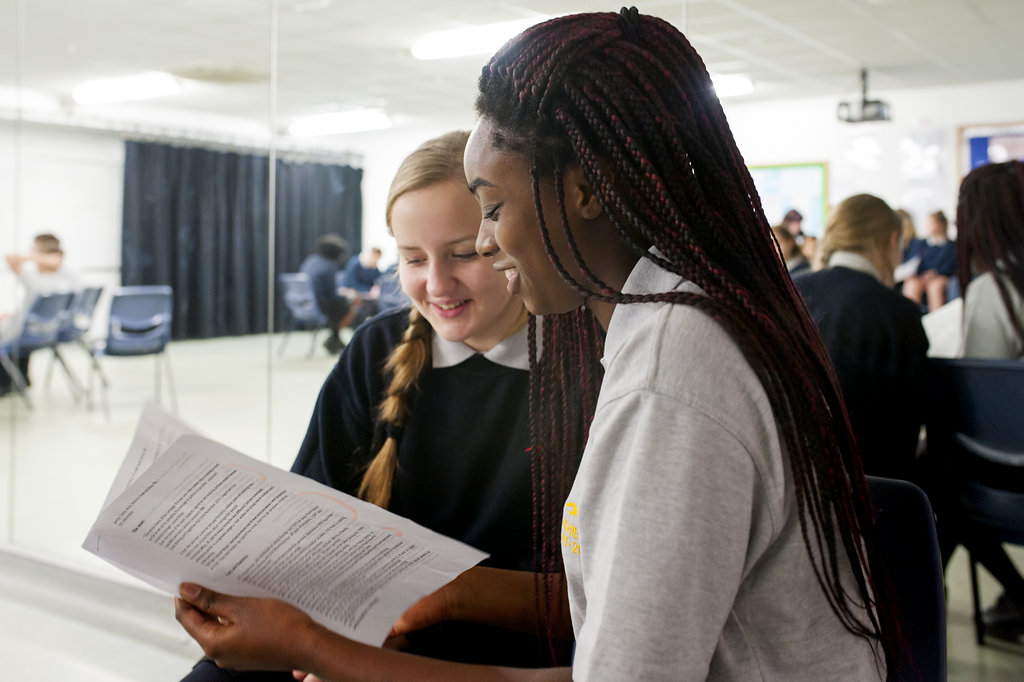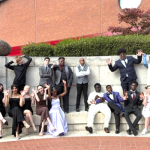| Half Term | Year 7 | Year 8 | Year 9 |
|
1
|
Intro to Theatre
A series of exercises & games to introduce and instil the basic skills necessary for drama to take place. Basic drama skills- as storytelling, soundscapes, hot seating, movement, and mime. Based on theme of a haunted house, ‘Darkwood Manor’.
Number of lessons: 8 |
Brecht
Practical workshops- exploring the theatre practitioner Brecht. Gives the students an opportunity to study his methods and techniques. Students then get to devise a short piece applying these successfully to a live audience.
Number of lessons 8 |
The Stones
This project allows the students to be exposed to a true story about two boys that were charged for attempted murder for throwing stones off a bridge on the A12. It opens debate and discussions around the severity of the boys’ actions as well as building upon the fundamental skills and techniques required at GCSE.
Number of lessons 8
|
|
2
|
Intro to Theatre Continued…
A series of exercises & games to introduce and instil the basic skills necessary for drama to take place. Basic drama skills- as storytelling, soundscapes, hot seating, movement, and mime. Based on theme of a haunted house, ‘Darkwood Manor’.
Number of lessons: 8
|
Ernie’s Incredible Illucinations
Students learn how to interpret a play script, to cast, to stage, to direct, to block, rehearse and refine a play. They also learn structure and further develop group skills as well as applying the Brecht techniques they learnt in project 1.
Number of lessons 8 |
Genocide
Explores issues and touches on stories from Rwandan genocide and the holocaust. Students have opportunities to apply a range of drama skills from naturalistic to non- naturalistic
Number of lessons 8 |
|
3
|
Shakespeare
Students will explore the main themes and issues within a variety of different Shakespearian plays through practical activities, live theatre and reading texts. They will also be exposed to traditional Elizabethan theatre and performing in the round and finding ways to contextualise theatre for a modern audience.
Number of lessons: 7
|
Physical Theatre: Objects to life
Introduction to physical theatre to explore physical skills including body control, puppetry, exaggeration, slow motion, pace, and transition. To help students gain an understanding of non-naturalism and symbolism.
Number of lessons: 7
|
Application of Physical Theatre
More advanced exploration of physical theatre skills touched on in year 8 during the Objects to life project. Introducing 3 theatre practitioners to extend students’ knowledge and preparing them for GCSE – Frantic Assembly, DV8 and Berkoff
Number of lessons 7 |
|
4
|
Murder in the Library
A look at the genre of whodunit? Revision of skills and disciplines acquired in previous projects and a chance to create deeper characters to present in a performance.
Number of lessons: 6 |
Trestle Masks To enable to students to explore basic Trestle Mask skills and techniques, taking part in exercises which allow them to develop these skills. Students will learn about the beginner’s trestle mask characters, exploring their personalities and how to present them practically. Students will take part in different improvisation scenarios, (learnt in year 7) putting their new knowledge and skills to practice and accumulate all their learning into a final devised masked scene.
Number of lessons: 6
|
Scripted Performance Girls Like That/Bang out of Order
A text based topical unit that will provide plenty of opportunities to discuss very relevant subjects such as internet. bullying/ empowerment of women/ the differences between boy’s views and girls/ anti-social behaviour /gangs /crime etc. It will introduce new and exciting ways to present drama.
Number of lessons: 6 |
|
5
|
Improvisation
This project gives the students the opportunity to embed the fundamental skills required for improvisation. They look at the difference between spontaneous and prepared improvisation that will encourage them to take risks and try out new styles of acting.
Number of lessons: 6 |
Kerry Smith
A thematic unit which explores dilemmas caused by teenage pregnancies. Dramatically it revisits various skills and forms to consolidate understanding of drama.
Number of lessons: 6 |
TIE
Students will develop a piece of theatre for a target audience about something they think that specific audience should know more about. They will have to research, and then implement this research so their piece is both educative and enjoyable. Student will either take on a performance, director or a designer role and will collaborate to create, rehearse, and showcase a form production that will be presented to our feeder primary schools.
Number of lessons: 6
|
|
6
|
Mini Scripts
A fun project to introduce script work. Each lesson the students are presented with a new script that suggests context, style, and genre. Giving the students the opportunity to take their ideas form the page to the stage. Most of the mini scripts act as a springboard the students and they then using their devising skills previously learnt to complete their pieces ready for performance.
Number of lessons: 7 |
Devising
To enable to students to use their imagination and create original performance work based on a piece of stimuli. This project also gives them the opportunity to explore a variety of different staging’s to help make their work innovative and original. Skills will include working on using the imagination, devising from various stimuli, structuring a performance and performance skills
Number of lessons: 7 |
TIE Continued…
Students will develop a piece of theatre for a target audience about something they think that specific audience should know more about. They will have to research, and then implement this research so their piece is both educative and enjoyable. Student will either take on a performance, director or a designer role and will collaborate to create, rehearse, and showcase a form production that will be presented to our feeder primary schools.
Number of lessons: 7
|





